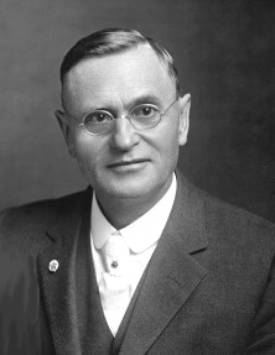Max Heindel (real name Carl Louis von Grasshoff) was
an American esotericist of German and Danish origins. His supporters are known
as the Rosicrucian Fellowship. Heindel 's message is an almost exact replica of
Rudolf Steiner's Anthroposophy, and the most likely explanation for this
seemingly mystical fact is that Heindel really got it from Steiner. He met
Steiner in Germany, attended his lectures and had two private meetings with
him. Steiner himself accused Heindel of “plagiarism” when the latter founded
his own little group. Heindel himself claimed that he received the teachings
from an Elder Brother of the Rosicrucian Order (everyone else would say a
spirit or angel). This origin story was presumably necessary in order for
Heindel to claim authority of his own, without having to acknowledge Herr
Doktor in Dornach…
“The Rosicrucian Christianity Lectures” confirm that Heindel was a better lecturer and writer than Steiner, but ironically, this gives many lectures a mundane feel, quite unlike the exotic meanderings of Anthroposophy's founder. At least this is the case in the first half of the book. The second half contains the more “esoteric” material.
The initial lectures deal with basic esoteric concepts such as astral and etheric bodies, the Akasha, reincarnation, the Ego, etc. Heindel is critical of Spiritualism and mediumship, claiming that mediums aren't really in touch with the souls of the departed. I admit that I found it somewhat useful. One lecture deals with astrology. The latter lectures are more specifically Heindelite (or Steinerite), dealing with such issues as Earth evolution, angelic hierarchies, Lemuria and Atlantis, the star of Bethlehem as “mystical fact”, etc. One lecture discusses the Mystery of Golgotha. The author's statements on race are borderline anti-Semitic. The main differences with Anthroposophy I noted was that Heindel doesn't mention Ahriman (the closest thing to a “devil” in Steiner's system), nor does he discuss the two Jesus children. Another quaint detail is that Heindel quotes H P Blavatsky's “The Secret Doctrine” but not, as far as I can tell, Steiner!
The whole point of it all is spiritual-cosmic evolution, in which humanity plays a central role. I no longer find this kind of anthropocentrism and belief in eternal progress convincing. If you do, or if you simply have a strong interest in the descendants and cousins of Theosophy, you might find Max Heindel's version interesting. It's also interesting from a comparative religion viewpoint. Imagine if Steiner's movement had disappeared, while Heindel's had thrived. Then we would have assumed that Anthroposophy was really the creation of a guy in Oceanside, California…
That opens up many intriguing possibilities, wouldn't you say?

No comments:
Post a Comment